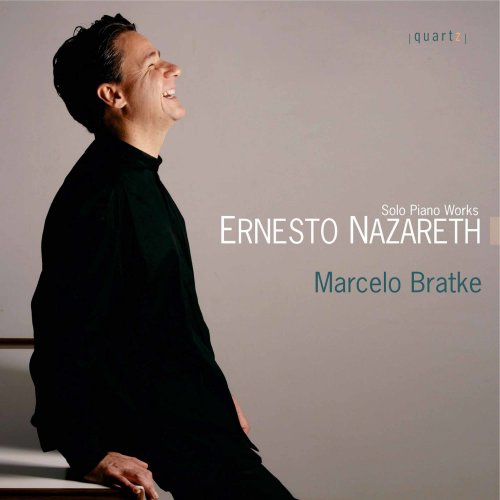
Marcelo Bratke - Ernesto Nazareth: Solo Piano Works (2008)
BAND/ARTIST: Marcelo Bratke
- Title: Ernesto Nazareth: Solo Piano Works
- Year Of Release: 20008
- Label: Quartz Music
- Genre: Classical Piano
- Quality: flac lossless (tracks)
- Total Time: 01:04:01
- Total Size: 219 mb
- WebSite: Album Preview
Tracklist
01. Brejeiro
02. Passaros em festa
03. Tenebroso
04. Apanhei-te, Cavaquinho
05. Confidencias
06. Sarambeque
07. Travesso
08. Coração que sente
09. Odeón
10. Eponina
11. Cubanos
12. Cre e espera
13. Fon-fon
14. Vespers
15. Faceira
16. Batuque
17. Ameno Reseda
The music of Brazilian composer Ernesto Nazareth, in a sense, accomplished single-handedly what it took American culture several centuries to achieve: a fusion of European and African elements. Into a conventional "salon" piano style derived from Chopin, Nazareth introduced Afro-Brazilian rhythms and forms such as the choro and tango. The latter came in several flavors, and hearing Nazareth's facility in handling them reminds the listener that this Argentine-Uruguayan dance, just as much as purely Brazilian dances, originated among black South Americans. Brazilian pianist Marcelo Bratke, in his own notes, draws a compelling picture of the young Nazareth performing in genteel Brazilian halls whose windows have been thrown open due to the tropical heat, and thus hearing the African percussion emanating from Rio's hillside slums. Bratke selects pieces that are well known among Brazilians and that showcase Nazareth's substantial melodic gift; just try to get the main tune of the tango Brejeiro, track 1, out of your head after sampling it. From a North American point of view, it is a bit of a shame that the polka genre is represented by only a single piece, Ameno Resedá, track 15; the collision of African rhythms with those of the march family resulted in pieces that sound startlingly like piano rags, and Nazareth wrote a lot of these. The program here, swaying between waltz and tango, is compelling in itself, however. Bratke's background is in classical music, and it is possible to emphasize the syncopations present in the music (even in the waltzes) more than he does. In his notes, though, Bratke points to Nazareth's own ambivalence about the African genres, which were strictly circumscribed at the time in Brazil (which did not abolish slavery until 25 years after the United States, with its own late abolition). His rather decorous approach may have the advantage of approaching the music on its own terms rather than reasoning backward from samba, Brazilian jazz, and all the glorious colors of the Brazilian musical rainbow that, as Bratke rightly notes, Nazareth helped inspire. This is a helpful single-disc introduction to Nazareth, leaving room to pursue his artistry in greater depth.
01. Brejeiro
02. Passaros em festa
03. Tenebroso
04. Apanhei-te, Cavaquinho
05. Confidencias
06. Sarambeque
07. Travesso
08. Coração que sente
09. Odeón
10. Eponina
11. Cubanos
12. Cre e espera
13. Fon-fon
14. Vespers
15. Faceira
16. Batuque
17. Ameno Reseda
The music of Brazilian composer Ernesto Nazareth, in a sense, accomplished single-handedly what it took American culture several centuries to achieve: a fusion of European and African elements. Into a conventional "salon" piano style derived from Chopin, Nazareth introduced Afro-Brazilian rhythms and forms such as the choro and tango. The latter came in several flavors, and hearing Nazareth's facility in handling them reminds the listener that this Argentine-Uruguayan dance, just as much as purely Brazilian dances, originated among black South Americans. Brazilian pianist Marcelo Bratke, in his own notes, draws a compelling picture of the young Nazareth performing in genteel Brazilian halls whose windows have been thrown open due to the tropical heat, and thus hearing the African percussion emanating from Rio's hillside slums. Bratke selects pieces that are well known among Brazilians and that showcase Nazareth's substantial melodic gift; just try to get the main tune of the tango Brejeiro, track 1, out of your head after sampling it. From a North American point of view, it is a bit of a shame that the polka genre is represented by only a single piece, Ameno Resedá, track 15; the collision of African rhythms with those of the march family resulted in pieces that sound startlingly like piano rags, and Nazareth wrote a lot of these. The program here, swaying between waltz and tango, is compelling in itself, however. Bratke's background is in classical music, and it is possible to emphasize the syncopations present in the music (even in the waltzes) more than he does. In his notes, though, Bratke points to Nazareth's own ambivalence about the African genres, which were strictly circumscribed at the time in Brazil (which did not abolish slavery until 25 years after the United States, with its own late abolition). His rather decorous approach may have the advantage of approaching the music on its own terms rather than reasoning backward from samba, Brazilian jazz, and all the glorious colors of the Brazilian musical rainbow that, as Bratke rightly notes, Nazareth helped inspire. This is a helpful single-disc introduction to Nazareth, leaving room to pursue his artistry in greater depth.
As a ISRA.CLOUD's PREMIUM member you will have the following benefits:
- Unlimited high speed downloads
- Download directly without waiting time
- Unlimited parallel downloads
- Support for download accelerators
- No advertising
- Resume broken downloads


